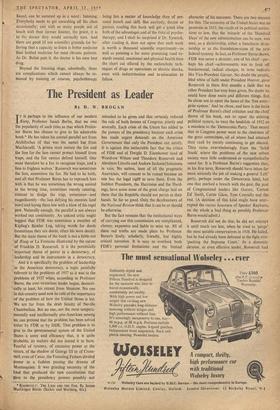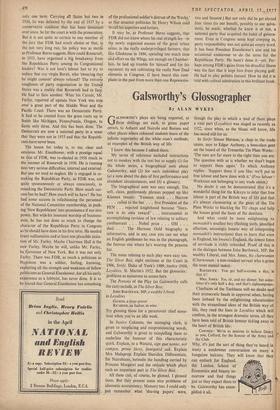The President as Leader
By D. W. BROGAN IT is perhaps to the influence of our modern /Esop, Professor Isaiah Berlin, that we owe the popularity of such titles as that which Profes- sor Burns has chosen to give to his admirable book.* He has taken his animal parallel not from Archilochus (if that was the name) but from Machiavelli. 'A prince must imitate the fox and the lion for the lion cannot protect himself from traps, and the fox cannot defend himself. One must therefore be a fox to recognise traps, and a lion to frighten wolves.' Roosevelt was sometimes the lion, sometimes the fox. He had to be both, and all that Professor Burns has to reproach him with is that he was sometimes the wrong animal at the wrong time, sometimes merely cunning, content to dodge the trap, sometimes—and magnificently—the lion defying his enemies (and ours) and laying them low with a blow of his regal paw. Naturally enough, the parallel is not always worked out consistently. An unkind critic might suggest that FDR was sometimes a member of Kipling's Bandar Log, taking words for deeds (sometimes they are deeds, often his were deeds). But the main theme of the book is not a fable out of /Esop or La Fontaine illustrated by the career of Franklin D. Roosevelt. It is the perennially important theme of power in a democracy, of leadership and its instruments in a democracy, And it is specifically the problem of leadership in the American democracy, a topic painfully relevant to the problems of 1957 as it was to the problems of 1937 when, according to Professor Burns, the ever-victorious leader began, domesti- cally at least, his retreat from Moscow. No one in this country need now be told of the importance of the problem of how the United States is led. We are far from the drab fatuity of Neville Chamberlain. But no one, not the most tempera- mentally and intellectually pro-American among us, can pretend that the problem has been solved either by FDR or by DDE. That problem is to give to the governmental system of the United States a unity and efficiency that, it is quite probable, its makers did not intend it to have. Fearful of tyranny, of excessive power at the centre, of the shadow of George III or of Crom- well, even of Caesar, the Founding Fathers divided power in a fashion passing the dreams of Montesquieu. It was grinding necessity of the kind that produced the new constitution that gave to the presidency powers .possibly not * ROOSEVELT: THE LION AND THE FOX. By James MacGregor Burns. (Seeker and Warburg, 45s.) intended to be given and that certainly reduced the role of both houses of Congress, jointly and severally. Each crisis of the Union has added to the powers of the presidency because each crisis has made urgent demands on the American Government that only the President can satisfy. It is against this ineluctable fact that the critics of FDR and of Dwight D. Eisenhower (and of Woodrow Wilson and Theodore Roosevelt and Abraham Lincoln and Andrew Jackson) fulminate in vain. No nation, least of all the pragmatic Americans, will consent to be ruined because no one has the legal right to save them. Even the feeblest Presidents, the Harrisons and the Hard- ings, have some sense of the great charge laid on them that the Republic should not perish at their hands. So far so good. Only the daydreamers of the National Review think that it can be or should be otherwise.
But the fact remains that the institutional ways of carrying out this commission are complicated, clumsy, expensive and liable to seize up. All of these sad truths are made plain by Professor Burns's lively, scholarly, friendly, but highly critical narrative. It is easy to overlook both FDR's personal limitations and the limited character of his successes. There are two reasons for this. The economy of the United States was so prostrate in 1933; the credit of its political institu- tions so low, that the 'miracle' of the 'Hundred Days' of the new administration can be seen, was seen, as a dictatorship, either a beneficent dicta- torship or as the foundation-stone of the new federal tyranny. In fact, as Professor Burns shows, FDR was never a dictator; one of his chief—per- haps his chief—achievements was to fend off fundamental, radical changes, to tame radicals like Vice-President Garner. No doubt the people, bled white of faith under President Hoover, gave Roosevelt in these first months a faith that no other Presiderit has ever been given. No doubt he could have done more and different things. But he chose not to upset the bases of the 'free enter- prise system.' And he chose, and here is the basis of Professor Burns's chief criticism and the chief theme of his book, not to upset the existing political system, to treat the landslide of 1932 as a mandate to the 'Democratic Party.' That meant that in Congress power went to the chairmen of the great committees, all of whom had attained their rank by merely continuing to get elected. They came overwhelmingly from the 'Solid South' where the problems of the new urban society were little understood or sympathetically cared for. It is Professor. Burns's suggestion that, in his first term, Roosevelt should have taken far more seriously the job of making a general 'Left'• party, perhaps under the Democratic label, but one that marked a breach with the past, the past of Congressional leaders like Garner, 'Cotton Ed' Smith, Carter Glass, Tom Connally and the rest. (A decision of this kind might have inter- rupted the cursus hottorunt of Speaker Rayburn„ on the whole a bad thing as possibly Professor Burns would admit.) Roosevelt did not do this; he did not attempt it until much too late, when he tried to 'purge' the most notable conservatives in 1938. He failed, but he had already been defeated in the fight over 'packing the Supreme Court.' As a domestic dictator, or even effective leader. Roosevelt had only one term. Carrying all States but two in 1936, he was defeated by the end of 1937 by a conservative coalition that has been dominant ever since. So far the court is with the prosecution: But it is not quite so certain to one member of the jury that FDR had much choice or that, in the not very long run, his policy was as sterile as Professor Burns suggests. How could Roosevelt, in 1933, have organised a big breakaway from the Republican Party among its Congressional leaders? Was it not love's labour lost to try to seduce that coy virgin Borah, who 'swearing that he might consent' always refused? The extreme toughness of party organisation in the Unitefl. States was a reality that Roosevelt had to face: He had to face another. What his Carnot, Mr. Farley, reported of upstate New York was true over a great part of the Middle West and the Pacific Coast. There was no Democratic Party. It had to be created from the grass roots up in States like Michigan, Pennsylvania, Oregon, to name only three. And this has been done. The Democrats are now a national party in a sense that they were not in 1933 and that the Republi- cans have never been.
The lesson for today is, to me, clear and ominous. Mr. Eisenhower, with a prestige equal to that of FDR, was re-elected in 1956 much in the manner of Roosevelt in 1936. He is running into very serious difficulties, internal and external. But one we tend to neglect. He is engaged in re- making the Republican Party, as FDR was, not quite spontaneously or always consciously, in remaking the Democratic Party. How much suc- cess has he had? How much will he have? He has had some success in refashioning the personnel of the National Committee membership, in push- ing 'New Republicans' into prominence if not into power. But with his innocent worship of business- men, he has not done as much to change the character of the Republican Party in Congress as he should have done in his first term. He needed fewer millionaires and at least one plausible imita- tion of Mr. Farley. Maybe Chairman Hall is the new Farley. Maybe he will, unlike Mr. Farley, be Governor of New York. But it was not only Farley. There was FDR, as much a politician as Napoleon was a soldier, feeling, knowing, exploiting all the strength and weakness of fellow politicians as General Eisenhower, for all his early experience as a lobbyist, has never done. It is to be feared that General Eisenhower has something of the professional soldier's distrust of the 'frocks,' as that amateur politician Sir Henry Wilson used to call his superiors and betters.
It may be, as Professor Burns suggests, that FDR did not know where his real strength lay—in the newly organised masses of the great urban areas, in the really underprivileged farmers; that like Gladstone in 1886, spending too much time and effort on the Whigs, not enough on Chamber- lain, he laid up trouble for himself and for his successor, by not cultivating the really New Deal • elements in Congress. (I have heard this com- plaint in the past from more than one Representa- Live and Senator.) But not only did he get elected four times (to our benefit, possibly to our salva- tion), he made, whether he knew it or not, a national party that acquired the habit of govern- ment. Even in Congress sense kept creeping in, party responsibility was not quite an empty word. It has been President Eisenhower's aim and his occasional endeavour to do the same for the Republican Party. He hasn't done it—yet. Per- haps among FDR's gains from his dreadful illness was the fact that it kept him from playing golf. He had to play politics instead. How he did it is told with critical admiration in this brilliant book.



































 Previous page
Previous page